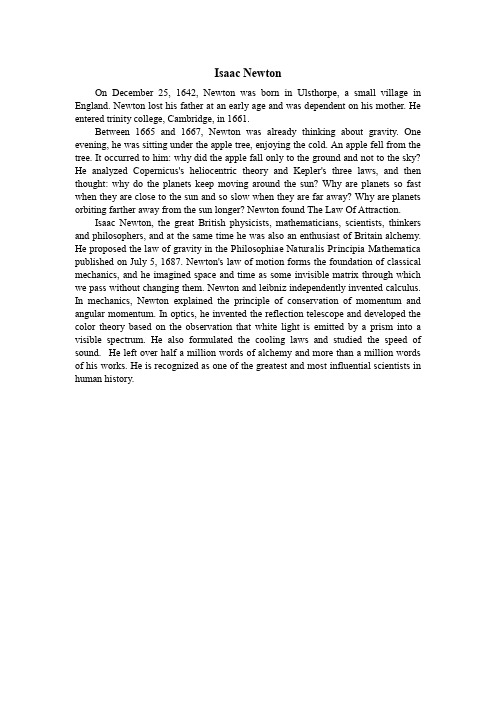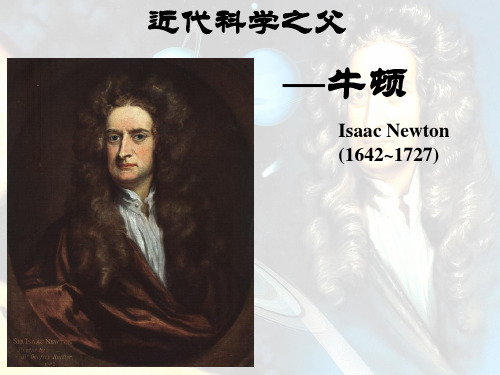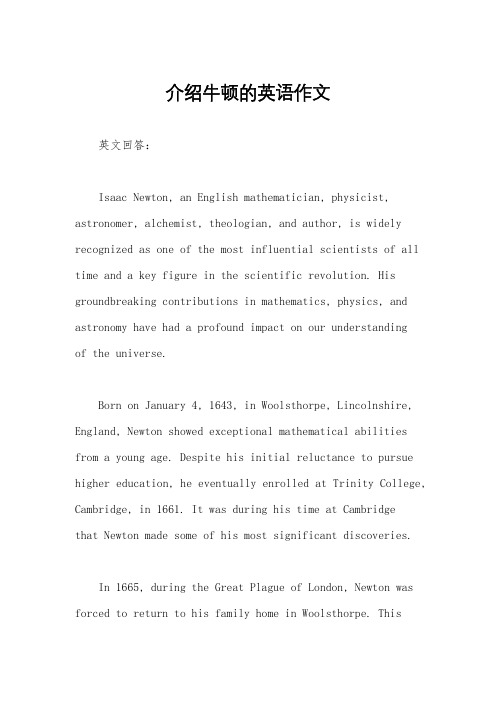牛顿的一生【英文】
牛顿简介英文版

Isaac NewtonOn December 25, 1642, Newton was born in Ulsthorpe, a small village in England. Newton lost his father at an early age and was dependent on his mother. He entered trinity college, Cambridge, in 1661.Between 1665 and 1667, Newton was already thinking about gravity. One evening, he was sitting under the apple tree, enjoying the cold. An apple fell from the tree. It occurred to him: why did the apple fall only to the ground and not to the sky? He analyzed Copernicus's heliocentric theory and Kepler's three laws, and then thought: why do the planets keep moving around the sun? Why are planets so fast when they are close to the sun and so slow when they are far away? Why are planets orbiting farther away from the sun longer? Newton found The Law Of Attraction.Isaac Newton, the great British physicists, mathematicians, scientists, thinkers and philosophers, and at the same time he was also an enthusiast of Britain alchemy. He proposed the law of gravity in the Philosophiae Naturalis Principia Mathematica published on July 5, 1687. Newton's law of motion forms the foundation of classical mechanics, and he imagined space and time as some invisible matrix through which we pass without changing them. Newton and leibniz independently invented calculus. In mechanics, Newton explained the principle of conservation of momentum and angular momentum. In optics, he invented the reflection telescope and developed the color theory based on the observation that white light is emitted by a prism into a visible spectrum. He also formulated the cooling laws and studied the speed of sound. He left over half a million words of alchemy and more than a million words of his works. He is recognized as one of the greatest and most influential scientists in human history.。
_近代科学之父牛顿英语介绍

.
.
•
2 Newton almost became a farmer . Newton was born in a farming family. When he was 17 years old, her mother insisted on Newton comes home from school to do farm work. Thank goodness, Newton was not good at farm work. Not a
牛顿在中学时代学习成绩并不出众,但对自然现象有好奇心,尤其是几何学、哥白尼的日心说 等等。他还分门别类的记读书笔记,喜欢做些小试验。
Later ,his mother asked Newton to leave school and work on their farm to support their family. But Newton would devote himself whenever possible. When his mother told him to learn the work of business, he hided in the bushes in order to read a book. On one occasion, his uncle found that his nephew lying on the grass, concentrating on study of a mathematical problem. his uncle was moved, then he persuaded Newton’s mother to let Newton return school, and encourages Newton to go to university. Newton returned to school to study again
介绍牛顿的英语作文

介绍牛顿的英语作文英文回答:Isaac Newton, an English mathematician, physicist, astronomer, alchemist, theologian, and author, is widely recognized as one of the most influential scientists of all time and a key figure in the scientific revolution. His groundbreaking contributions in mathematics, physics, and astronomy have had a profound impact on our understandingof the universe.Born on January 4, 1643, in Woolsthorpe, Lincolnshire, England, Newton showed exceptional mathematical abilities from a young age. Despite his initial reluctance to pursue higher education, he eventually enrolled at Trinity College, Cambridge, in 1661. It was during his time at Cambridgethat Newton made some of his most significant discoveries.In 1665, during the Great Plague of London, Newton was forced to return to his family home in Woolsthorpe. Thisperiod of isolation proved to be highly productive for Newton, and it was during this time that he developed his fundamental laws of motion and universal gravitation. These groundbreaking theories laid the foundation for classical mechanics and celestial mechanics, and they continue to be essential components of modern physics.After returning to Cambridge in 1667, Newton published his seminal work "Philosophiæ Naturalis Principia Mathematica" (Mathematical Principles of Natural Philosophy) in 1687. This masterpiece presented his three laws ofmotion and his law of universal gravitation, whichexplained the motion of celestial bodies and provided a unified framework for understanding the physical world.Newton's contributions to mathematics were equally significant. He developed the calculus, a powerful mathematical tool that revolutionized the fields of mathematics and physics. He also made importantcontributions to the study of optics, including his discovery of the composition of white light and the development of the reflecting telescope.Besides his scientific achievements, Newton was also deeply interested in theology and alchemy. He wrote extensively on biblical interpretation and the existence of God. Newton's religious beliefs influenced his scientific work, and he saw his discoveries as evidence of the harmony and order of the universe.Throughout his life, Newton received numerous honors and accolades for his scientific contributions. He was knighted by Queen Anne in 1705 and served as President of the Royal Society from 1703 to 1727.Isaac Newton's legacy is immense. His groundbreaking discoveries in mathematics, physics, and astronomy laid the foundation for modern science, and his ideas continue to inspire and challenge scientists to this day. His name remains synonymous with scientific genius and his contributions to the advancement of human knowledge are immeasurable.中文回答:牛顿简介。
牛顿英语作文介绍

Isaac Newton: The Genius WhoRevolutionized ScienceIsaac Newton, a name synonymous with scientific revolution, revolutionized the field of physics with his laws of motion and gravity. Born in 1643, Newton was a prodigy from a young age, demonstrating an exceptional understanding of mathematics and science. His journey to becoming one of the greatest scientists of all time began with his curiosity and dedication to understanding the natural world.Newton's life was not always smooth sailing. He experienced significant personal losses, including the death of his mother when he was just three years old and his father soon after. These tragedies left him in the care of his grandparents, who recognized his intellectual abilities and encouraged him to pursue his studies.Newton's breakthrough moment came when he developed his three laws of motion, which form the foundation ofclassical mechanics. These laws describe how objects move and interact with forces, providing a mathematicalframework to understand the motion of objects in thephysical world.His laws of motion were followed by his theory of gravity, which explained the force that attracts objects towards each other. Newton's law of gravity states that every mass attracts every other mass with a force proportional to their masses and inversely proportional to the square of the distance between them. This theory revolutionized our understanding of the universe,explaining phenomena such as planetary motion and the tides. Newton's contributions to science did not end there. He also made significant contributions to the fields of optics, calculus, and astronomy. His work on optics led to the development of the reflecting telescope, while his development of calculus provided a new mathematical toolfor scientists to study change and motion.Despite his many achievements, Newton remained humble and dedicated to his research. He was a firm believer inthe importance of experimentation and observation, stating that "hypotheses non fingo" (I do not feign hypotheses).This dedication to scientific method and rigorous thinking has left a lasting impact on the scientific community.Isaac Newton's life and work serve as an inspiration to scientists and researchers around the world. His legacy is not just in his laws and theories, but in his dedication to understanding the natural world through rigorous experimentation and observation. His impact on science and human understanding remains felt today, more than 300 years after his death.**艾萨克·牛顿:科学革命的天才**艾萨克·牛顿,一个与科学革命同名的名字,以其运动定律和万有引力定律彻底改变了物理学领域。
牛顿的一生英语小作文

牛顿的一生英语小作文Sir Isaac Newton was one of the most influential scientists in history. Born in 1642 in Woolsthorpe Manor, Lincolnshire, England, he made significant contributions to the fields of physics, mathematics, astronomy, and natural philosophy. His groundbreaking work laid the foundation for our modern understanding of the physical world.Newton's early life was marked by adversity. His father, also named Isaac Newton, died before he was born, and his mother remarried when he was just three years old, leaving him in the care of his grandmother. Despite these challenges, Newton showed a keen intellect from a young age, excelling in his studies and demonstrating a natural aptitude for problem-solving.As a young man, Newton attended the prestigious Trinity College, Cambridge, where he would go on to make some of his most remarkable discoveries. It was during his time at Cambridge that he developed his revolutionary theories on the nature of light, optics, and the laws of motion. His work on the laws of motion, which describe the relationship between an object's motion and the forcesacting upon it, would become the foundation of classical mechanics.One of Newton's most famous contributions to science was his work on the theory of gravity. In 1666, while observing an apple fall from a tree, Newton had a eureka moment and realized that the same force that pulled the apple to the ground must also be responsible for the motion of the planets and other celestial bodies. This insight led him to formulate his law of universal gravitation, which states that every particle in the universe attracts every other particle with a force that is directly proportional to the product of their masses and inversely proportional to the square of the distance between them.Newton's work on gravity not only explained the motion of the planets but also provided a unified theory of the physical world. His groundbreaking ideas were met with both enthusiasm and skepticism, but over time, his theories were widely accepted and became the foundation of modern physics.In addition to his work on physics and astronomy, Newton made significant contributions to the field of mathematics. He is credited with developing the branch of mathematics known as calculus, which revolutionized the way we understand and describe the natural world. His work on calculus, along with his contributions to the fields of optics and mechanics, earned him a reputation as one of the greatest scientists of all time.Despite his immense accomplishments, Newton's personal life was not without its challenges. He was known to be reclusive and introverted, and he struggled with mental health issues throughout his life. He was also embroiled in several bitter feuds with other scientists, including the famous dispute with German mathematician Gottfried Leibniz over the invention of calculus.Despite these personal struggles, Newton's impact on the world of science cannot be overstated. His work has had a lasting influence on our understanding of the physical world, and his contributions have paved the way for countless scientific advancements. Today, he is widely regarded as one of the most important figures in the history of science, and his legacy continues to inspire and captivate people around the world.In conclusion, Sir Isaac Newton's life and work have had a profound impact on our understanding of the physical world. From his groundbreaking theories on the laws of motion and the nature of gravity to his contributions to the field of mathematics, Newton's legacy as one of the greatest scientists of all time is secure. Despite the challenges he faced throughout his life, his unwavering dedication to scientific inquiry and his remarkable intellect have left an indelible mark on the course of human history.。
牛顿的简介作文英文

牛顿的简介作文英文Isaac Newton was a famous scientist and mathematician. He was born in 1642 in England and is best known for his work on the laws of motion and universal gravitation. Newton's work laid the foundation for classical mechanics and his book "Philosophiæ Naturalis Principia Mathematica" is one of the most influential books in the history of science.Newton made several important discoveries during his lifetime. He developed the three laws of motion, which describe the relationship between a body and the forces acting on it. He also formulated the law of universal gravitation, which states that every particle of matter in the universe attracts every other particle with a forcethat is directly proportional to the product of their masses and inversely proportional to the square of the distance between their centers.In addition to his work in physics, Newton also madesignificant contributions to mathematics. He is creditedwith the development of calculus, along with German mathematician Gottfried Wilhelm Leibniz. Newton's work in mathematics and physics revolutionized the way weunderstand the natural world and laid the groundwork for many future scientific discoveries.Newton's impact on the scientific community was immense, and his work continues to influence scientists and mathematicians to this day. He was knighted by Queen Annein 1705 and spent the later years of his life as the president of the Royal Society, where he continued to make important contributions to scientific research and scholarship.Newton's legacy is one of innovation and discovery. His work in physics and mathematics has had a lasting impact on the way we understand the natural world, and his ideas continue to be studied and celebrated by scientists and scholars around the world. Isaac Newton will always be remembered as one of the greatest scientific minds in history.。
英语牛顿传记小作文

英语牛顿传记小作文英文回答:Isaac Newton, one of the most influential scientists of all time, was born on January 4, 1643, in Woolsthorpe, Lincolnshire, England. He was a physicist, mathematician, astronomer, alchemist, theologian, and author who is widely recognized as one of the greatest minds in history.Newton's early life was marked by tragedy and hardship. His father died three months before he was born, and his mother remarried when Newton was three years old, leaving him in the care of his maternal grandmother. Newton was a sickly child and often suffered from headaches anddigestive problems.Despite his early challenges, Newton showed an early aptitude for mathematics and science. He attended Trinity College, Cambridge, where he studied mathematics and natural philosophy. After graduating, he remained atCambridge as a fellow and lecturer.In 1665, the Great Plague of London forced Newton to leave Cambridge and return to his home in Woolsthorpe. It was during this period of isolation that Newton made some of his most important discoveries. He developed his theory of calculus, the laws of motion, and the law of universal gravitation.Newton's theory of calculus was a revolutionary new mathematical tool that allowed scientists to solve complex problems involving motion and change. His laws of motion described the relationship between an object's mass, velocity, and acceleration. The law of universal gravitation explained the attraction between any two objects in the universe.Newton's discoveries had a profound impact on the development of science. His work laid the foundation for classical mechanics, which dominated physics for over two centuries. His theories also provided a new understanding of the universe and its laws.In 1687, Newton published his seminal work, "Principia Mathematica," which contained his three laws of motion and the law of universal gravitation. This book is considered one of the most important scientific works ever written.In addition to his scientific work, Newton also made significant contributions to alchemy, theology, and politics. He served as a Member of Parliament for several years and was Master of the Royal Mint from 1696 until his death in 1727.Isaac Newton was a brilliant scientist whose discoveries revolutionized our understanding of the universe. His work has had a lasting impact on science and technology and continues to inspire scientists and engineers today.中文回答:艾萨克·牛顿,史上极有影响力的科学家之一,1643 年 1 月4 日出生于英格兰林肯郡伍尔索普。
英语牛顿传记小作文

英语牛顿传记小作文英文回答:Sir Isaac Newton, an English mathematician, physicist, astronomer, alchemist, theologian, and author who lived from 1642 to 1727, is widely recognized as one of the most influential scientists of all time and a key figure in the scientific revolution. He is best known for his discovery of the laws of motion and universal gravitation, which laid the foundation for classical mechanics. Newton's work also had a profound impact on the fields of mathematics, optics, and astronomy.Born in Woolsthorpe, Lincolnshire, Newton was a precocious child who showed an early aptitude for mathematics and science. He attended Trinity College, Cambridge, where he studied under Isaac Barrow. In 1665, during the Great Plague of London, Newton returned to Woolsthorpe, where he made some of his most important discoveries. It was during this period that he developedhis theory of calculus, investigated the laws of motion, and formulated his law of universal gravitation.In 1687, Newton published his seminal work, "Principia Mathematica," which revolutionized the understanding of the laws of motion and gravity. The book presented Newton's three laws of motion and his law of universal gravitation, providing a comprehensive framework for understanding the behavior of physical objects. "Principia Mathematica" had a profound influence on the development of physics and astronomy, and it remains a cornerstone of classical mechanics to this day.Newton's contributions to mathematics were also significant. He developed a method of calculus that allowed mathematicians to solve complex problems involving continuous change. He also made important contributions to the study of optics, including the discovery of the composition of white light and the development of the reflecting telescope.Newton's work extended beyond the realm of science. Hewas a devout Christian and wrote extensively on religious topics. His theological writings explored the relationship between science and religion, arguing that the laws of nature were evidence of God's design.Newton's legacy continues to inspire scientists, mathematicians, and scholars today. His work laid the foundation for much of modern science, and his discoveries have had a profound impact on our understanding of the universe. He is widely regarded as one of the greatest scientists of all time, and his contributions to scienceand mathematics have shaped the world in which we live.中文回答:艾萨克·牛顿爵士(Sir Isaac Newton)是一位英国数学家、物理学家、天文学家、炼金术士、神学家和作家,他生活在 1642年至 1727 年间,被广泛认为是有史以来最有影响力的科学家之一,也是科学革命中的关键人物。
